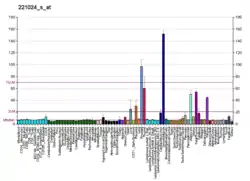SLC2A10
Solute carrier family 2, facilitated glucose transporter member 10 is a protein that in humans is encoded by the SLC2A10 gene.[5][6]
SLC2A10 is a member of the facilitative glucose transporter family, which plays a significant role in maintaining glucose homeostasis.[supplied by OMIM][6]
References
- GRCh38: Ensembl release 89: ENSG00000197496 - Ensembl, May 2017
- GRCm38: Ensembl release 89: ENSMUSG00000027661 - Ensembl, May 2017
- "Human PubMed Reference:". National Center for Biotechnology Information, U.S. National Library of Medicine.
- "Mouse PubMed Reference:". National Center for Biotechnology Information, U.S. National Library of Medicine.
- McVie-Wylie AJ, Lamson DR, Chen YT (Mar 2001). "Molecular cloning of a novel member of the GLUT family of transporters, SLC2a10 (GLUT10), localized on chromosome 20q13.1: a candidate gene for NIDDM susceptibility". Genomics. 72 (1): 113–7. doi:10.1006/geno.2000.6457. PMID 11247674.
- "Entrez Gene: SLC2A10 solute carrier family 2 (facilitated glucose transporter), member 10".
Further reading
- Dawson PA, Mychaleckyj JC, Fossey SC, et al. (2001). "Sequence and functional analysis of GLUT10: a glucose transporter in the Type 2 diabetes-linked region of chromosome 20q12-13.1". Mol. Genet. Metab. 74 (1–2): 186–99. doi:10.1006/mgme.2001.3212. PMID 11592815.
- Deloukas P, Matthews LH, Ashurst J, et al. (2002). "The DNA sequence and comparative analysis of human chromosome 20". Nature. 414 (6866): 865–71. doi:10.1038/414865a. PMID 11780052.
- Strausberg RL, Feingold EA, Grouse LH, et al. (2003). "Generation and initial analysis of more than 15,000 full-length human and mouse cDNA sequences". Proc. Natl. Acad. Sci. U.S.A. 99 (26): 16899–903. doi:10.1073/pnas.242603899. PMC 139241. PMID 12477932.
- Richardson S, Neama G, Phillips T, et al. (2003). "Molecular characterization and partial cDNA cloning of facilitative glucose transporters expressed in human articular chondrocytes; stimulation of 2-deoxyglucose uptake by IGF-I and elevated MMP-2 secretion by glucose deprivation". Osteoarthr. Cartil. 11 (2): 92–101. doi:10.1053/joca.2002.0858. PMID 12554125.
- Wood IS, Hunter L, Trayhurn P (2003). "Expression of Class III facilitative glucose transporter genes (GLUT-10 and GLUT-12) in mouse and human adipose tissues". Biochem. Biophys. Res. Commun. 308 (1): 43–9. doi:10.1016/S0006-291X(03)01322-6. PMID 12890477.
- Andersen G, Rose CS, Hamid YH, et al. (2003). "Genetic variation of the GLUT10 glucose transporter (SLC2A10) and relationships to type 2 diabetes and intermediary traits". Diabetes. 52 (9): 2445–8. doi:10.2337/diabetes.52.9.2445. PMID 12941788.
- Ota T, Suzuki Y, Nishikawa T, et al. (2004). "Complete sequencing and characterization of 21,243 full-length human cDNAs". Nat. Genet. 36 (1): 40–5. doi:10.1038/ng1285. PMID 14702039.
- Gerhard DS, Wagner L, Feingold EA, et al. (2004). "The Status, Quality, and Expansion of the NIH Full-Length cDNA Project: The Mammalian Gene Collection (MGC)". Genome Res. 14 (10B): 2121–7. doi:10.1101/gr.2596504. PMC 528928. PMID 15489334.
- Zaidi SH, Peltekova V, Meyer S, et al. (2005). "A family exhibiting arterial tortuosity syndrome displays homozygosity for markers in the arterial tortuosity locus at chromosome 20q13". Clin. Genet. 67 (2): 183–8. doi:10.1111/j.1399-0004.2004.00391.x. PMID 15679832. S2CID 21973630.
- Mohlke KL, Skol AD, Scott LJ, et al. (2005). "Evaluation of SLC2A10 (GLUT10) as a candidate gene for type 2 diabetes and related traits in Finns". Mol. Genet. Metab. 85 (4): 323–7. doi:10.1016/j.ymgme.2005.04.011. PMID 15936967.
- Segade F, Allred DC, Bowden DW (2005). "Functional characterization of the promoter of the human glucose transporter 10 gene". Biochim. Biophys. Acta. 1730 (2): 147–58. doi:10.1016/j.bbaexp.2005.06.012. PMID 16051383.
- Coucke PJ, Willaert A, Wessels MW, et al. (2006). "Mutations in the facilitative glucose transporter GLUT10 alter angiogenesis and cause arterial tortuosity syndrome" (PDF). Nat. Genet. 38 (4): 452–7. doi:10.1038/ng1764. hdl:11379/29243. PMID 16550171. S2CID 836017.
- Lin WH, Chuang LM, Chen CH, et al. (2006). "Association study of genetic polymorphisms of SLC2A10 gene and type 2 diabetes in the Taiwanese population". Diabetologia. 49 (6): 1214–21. doi:10.1007/s00125-006-0218-3. PMID 16586067.
This article incorporates text from the United States National Library of Medicine, which is in the public domain.
This article is issued from Wikipedia. The text is licensed under Creative Commons - Attribution - Sharealike. Additional terms may apply for the media files.




